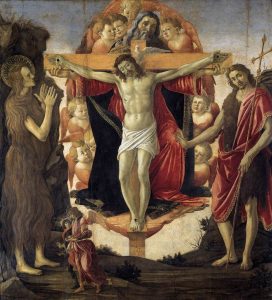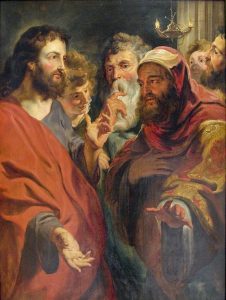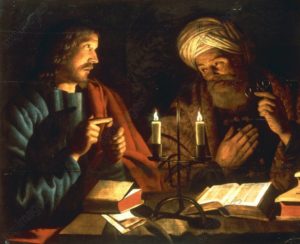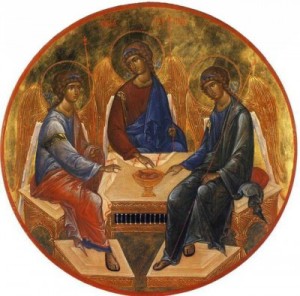Thoughts on Sunday’s Lessons for May 26, 2024 (Trinity Sunday B)

Holy Trinity with Mary Magdalene, John the Baptist and Tobias and the Angel, by Sandro Botticelli (1445-1510). Tempera and oil on panel, altarpiece for the church of Santa Elisabetta delle Convertite in Florence (c.1491-1494). Courtauld Gallery, London. (Click image to enlarge.)
First Reading: Isaiah 6:1-8
Last Sunday, on Pentecost, we marked the coming of the Holy Spirit in wind and fire. This week we celebrate Trinity Sunday, contemplating the triune relationship among Creator, Redeemer and Advocate. In our first reading we hear the Prophet Isaiah describing the vision in which God called him as a prophet. The news of this vocation does not bring Isaiah joy, but woe, for he does not consider himself worthy to see God. As he confesses that he is a man of unclean lips among a people of unclean lips, a seraph comes and purifies him with holy fire by touching a burning coal to the prophet’s lips. With that, when God calls him again, Isaiah steps up, saying “Here am I; send me!”
Psalm: Psalm 29
Have you ever sat on a porch with a mixture of fear and awe, watching a fierce summer thunderstorm pass by with lightning and thunder, wind and rain, whipping the trees around and whistling through the branches? Even towering oak trees seem to whirl, and large limbs come crashing down. It’s no wonder that the Psalmist chose to portray God’s power and glory in the metaphor of a massive storm that strips the forest bare. And yet, at the end, showing the emotion that comes when a storm passes, the people shout “Glory,” hailing God’s power and peace.
Alternate Psalm: Canticle 13
Canticle 13 from the Book of Common Prayer, “A Song of Praise,” may be sung as an alternate psalm this week. A poetic litany of praise and exaltation to God as Creator and King, it recalls the story of the three young men who danced and sang in defiance of the flames in King Nebuchadnezzar’s fiery furnace. Protected by God, as told in the Book of Daniel and the apocryphal Song of Azariah, the young men walked unharmed through the fire, singing a hymn of praise to God and all creation. Their full song is recorded as Canticle 12. Canticle 13 offers a modern conclusion, a 20th century addition that sings resounding praise to the Trinity: Father, Son, and Holy Spirit.
Second Reading: Romans 8:12-17
We turn back a page in Paul’s Letter to the Romans this week to hear these verses that come just before last week’s reading about Christians groaning in the pain and expectancy of a mother in labor as they wait for salvation. In this passage we see Paul building toward that image as he describes the great gift that awaits Christians: When we accept a life led by the Spirit, we become children of God, just as Jesus is the Son of God. Like Jesus we become heirs of God. Inspired by the Spirit, we recognize that suffering with Jesus opens us up to being glorified with Jesus.
Gospel: John 3:1-17
Sunday’s Gospel provides us context for John 3:16 (“‘For God so loved the world that he gave his only Son, so that everyone who believes in him may not perish but may have eternal life”) that a simple sign held up in a sports stadium can’t provide. Nicodemus, a Pharisee, comes to talk with Jesus by night, hoping no one will see him visiting the controversial rabbi. Nicodemus is curious but bewildered by Jesus’s mysterious language. What does it mean to be “born from above” (or as some translations render it, “born again”)? Nicodemus just can’t grasp the distinction between being literally born of flesh as an infant and metaphorically being born of the Holy Spirit in faith. Through the Son, from the Creator, inspired by the Spirit’s restless wind, we come to the Kingdom through a spiritual rebirth in faith and belief.



